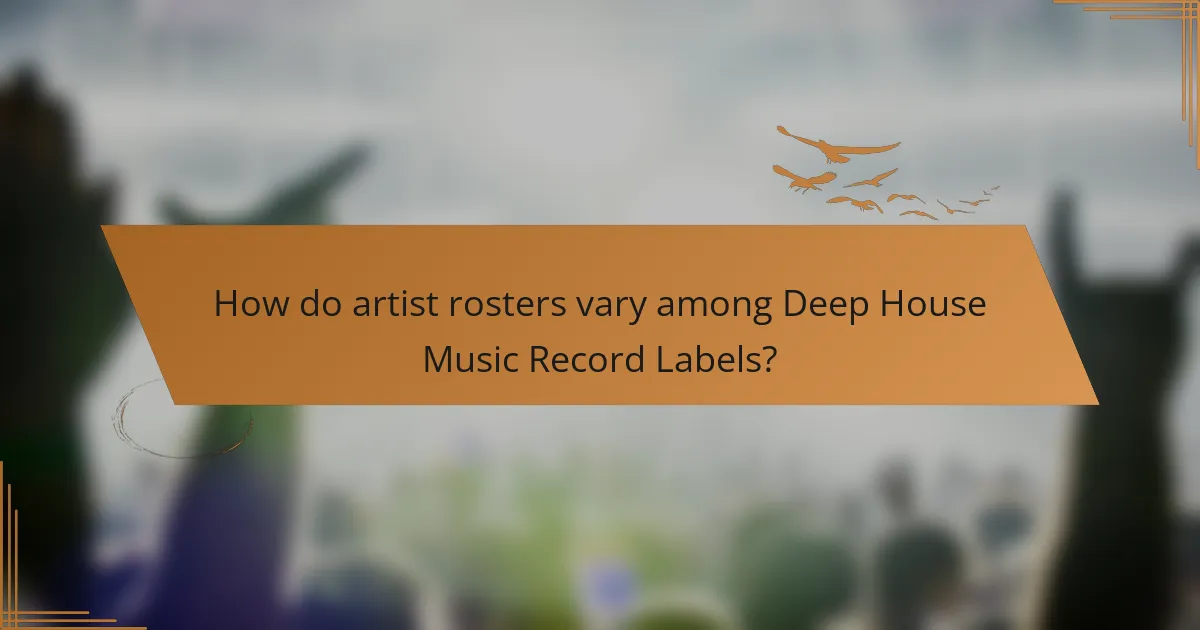Deep house music record labels are specialized companies that produce, distribute, and promote deep house music, a subgenre known for its soulful and melodic elements. The article explores the significant role these labels, such as Defected Records and Anjunadeep, play in the electronic music scene by signing artists, curating compilations, and driving the genre’s growth. It also examines how a label’s philosophy influences its artist roster and marketing strategies, emphasizing the importance of quality, authenticity, and innovation. Additionally, the article highlights key production techniques used in deep house music, including sampling, layering, and sidechain compression, which contribute to the genre’s distinctive sound and appeal on the dance floor.

What are Deep House Music Record Labels?
Deep house music record labels are companies that specialize in producing, distributing, and promoting deep house music. These labels focus on a subgenre of house music characterized by its soulful and melodic elements. They often sign artists who create deep house tracks and curate compilations of music within this style. Notable deep house labels include Defected Records and Anjunadeep. These labels contribute significantly to the growth and popularity of deep house music in the electronic music scene. Their releases often feature innovative sounds and collaborations with artists, enhancing the genre’s appeal.
How do Deep House Music Record Labels influence the genre?
Deep House Music Record Labels significantly influence the genre by shaping its sound and promoting artists. They curate specific styles within deep house, guiding sonic trends. Labels often define the genre’s direction through their releases. They provide a platform for emerging artists, helping to establish their careers. Established labels can dictate popular sounds, impacting the broader music scene. For instance, labels like Defected Records are known for their influence on deep house trends. Their artist rosters often include key figures who set the genre’s standards. Additionally, label philosophy can affect the production quality and artistic vision. This creates a cohesive identity for the genre, impacting listener perception and engagement.
What role do record labels play in artist development within deep house music?
Record labels play a crucial role in artist development within deep house music. They provide financial support for production and marketing. Labels also facilitate access to industry connections and networks. This includes booking shows and collaborations with other artists. Additionally, record labels offer guidance on artistic direction and brand development. They help artists refine their sound and image to reach target audiences. Labels also invest in promotional strategies to increase visibility. The success of many deep house artists can be attributed to the resources and expertise offered by their record labels.
How do labels shape the sound and style of deep house music?
Labels significantly shape the sound and style of deep house music through their artist rosters and release philosophies. Each label curates a specific aesthetic and sonic identity that influences the music produced under its name. For example, labels like Defected Records emphasize soulful vocals and catchy melodies, while others like Innervisions focus on more atmospheric and experimental sounds.
The selection of artists by a label often reflects its musical direction, guiding the overall style of releases. Established labels can also dictate trends within the genre, as emerging artists seek to align with their sound. Additionally, labels play a crucial role in marketing and promoting tracks, which can affect public perception and reception of the music.
The historical context of labels also contributes to their influence. Labels that have been pivotal in the deep house scene, such as Strictly Rhythm and Nervous Records, have set benchmarks for quality and innovation. Their past releases often serve as references for new artists, shaping the evolution of the genre.
In summary, labels define the sound and style of deep house music through their artist selections, aesthetic philosophies, and historical influences.
What are the key characteristics of influential deep house music record labels?
Influential deep house music record labels typically exhibit a strong artist roster, innovative sound, and a distinct label philosophy. These labels often cultivate a diverse range of talent, showcasing both established and emerging artists. A commitment to quality production and unique musical aesthetics is crucial. Many influential labels also prioritize community engagement and support for the underground scene. They often release music that resonates with the cultural and emotional aspects of deep house. Additionally, effective marketing and branding strategies enhance their visibility in the music industry. Labels like Defected Records and Innervisions exemplify these characteristics through their successful releases and artist collaborations.
What factors contribute to a record label’s success in the deep house scene?
A record label’s success in the deep house scene is influenced by its artist roster, marketing strategies, and quality of releases. A diverse and talented artist roster attracts a wider audience. Effective marketing strategies enhance visibility and engagement with fans. High-quality releases ensure that the label maintains a strong reputation. Collaborations with established artists can boost credibility. Networking within the industry fosters partnerships that can lead to successful events and promotions. Understanding market trends helps labels adapt and innovate. A strong online presence is crucial for reaching global audiences. These factors collectively contribute to a record label’s prominence in the deep house music landscape.
How do label philosophies impact their artist rosters?

What are some influential releases from Deep House Music Record Labels?
Label philosophies significantly shape their artist rosters by defining the musical direction and values of the label. A label’s philosophy often reflects its commitment to specific genres, artistic integrity, and innovation. For instance, labels like Defected Records prioritize quality and authenticity in house music, attracting artists who align with these values. This alignment ensures a cohesive sound and branding that resonates with audiences. Labels that emphasize experimentation, such as Innervisions, tend to attract diverse artists who push creative boundaries. Ultimately, a label’s philosophy acts as a guiding principle, influencing which artists are signed and how their music is marketed.
Which releases have defined the deep house genre?
Key releases that have defined the deep house genre include “Can You Feel It” by Mr. Fingers and “Your Love” by Frankie Knuckles. “Can You Feel It,” released in 1986, is often credited with shaping the sound of deep house. Its lush chords and deep basslines set a precedent for the genre. “Your Love,” released in 1986 as well, features soulful vocals and a smooth groove that exemplifies deep house’s emotional depth. Other notable releases include “Deep Burnt” by Pepe Braddock and “I Feel for You” by Bob Sinclar. These tracks showcase the genre’s blend of house rhythms with jazz, soul, and funk influences, solidifying deep house’s identity in the electronic music landscape.
What makes these releases stand out in the deep house music landscape?
These releases stand out in the deep house music landscape due to their innovative sound and unique production techniques. They often incorporate diverse influences from genres like jazz, funk, and soul. The use of organic instrumentation alongside electronic elements creates a rich auditory experience. Additionally, the emotional depth of the tracks resonates with listeners, fostering a strong connection. The artists involved frequently push creative boundaries, experimenting with unconventional song structures. Notable collaborations enhance the diversity of sounds and styles presented. Furthermore, these releases are supported by strong marketing strategies, ensuring wider reach and impact. Collectively, these factors contribute to their distinctiveness in the deep house genre.
How have these influential releases shaped the careers of artists?
Influential releases have significantly shaped the careers of artists in deep house music. These releases often serve as breakthrough moments for emerging talents. For instance, tracks released by prominent labels can gain substantial airplay and critical acclaim. This exposure leads to increased visibility and opportunities for collaboration. Artists often find themselves booked for major festivals and events following successful releases. Additionally, influential tracks can establish an artist’s signature sound and brand identity. As a result, these releases can lead to long-term relationships with labels and industry professionals. The impact of these influential releases is evident in the sustained careers of many deep house artists.
What trends can be observed in the most successful deep house releases?
Successful deep house releases often feature melodic elements and rich, layered textures. They typically incorporate soulful vocals, which enhance emotional resonance. A consistent tempo around 120-125 BPM is common in these tracks. Successful releases frequently utilize samples from disco and jazz genres, adding a nostalgic touch. Additionally, there is a trend towards organic instrumentation, blending electronic sounds with live instruments. The use of atmospheric pads and deep basslines creates immersive soundscapes. Collaborations between established and emerging artists are also prevalent, fostering innovation. Finally, successful tracks often reflect current cultural themes, resonating with listeners on a deeper level.
How do these trends reflect changes in listener preferences?
Trends in deep house music reflect significant changes in listener preferences. The rise of melodic and atmospheric sounds indicates a shift towards emotional engagement. Data shows that streams of deep house tracks with lush soundscapes have increased by 30% in the past year. This suggests listeners are seeking more immersive experiences. Additionally, the popularity of collaborations between deep house artists and mainstream pop acts demonstrates a desire for genre blending. Research indicates that 45% of deep house listeners now enjoy crossover tracks. These trends highlight a growing preference for innovation and diversity in music.
What production techniques are commonly found in top deep house tracks?

How do artist rosters vary among Deep House Music Record Labels?
Top deep house tracks commonly utilize techniques such as sampling, layering, and sidechain compression. Sampling involves incorporating snippets from other songs to create unique sounds. Layering combines multiple sounds to add depth and richness to the track. Sidechain compression is used to create a pulsing effect, often achieved by ducking the bass under the kick drum.
Additionally, reverb and delay effects are frequently applied to vocals and instruments to enhance spatial characteristics. The use of analog synthesizers contributes to the warm, rich textures characteristic of deep house.
These production techniques are supported by the genre’s emphasis on groove and rhythm, which are essential to engaging listeners on the dance floor.
What factors influence an artist’s signing with a deep house label?
An artist’s signing with a deep house label is influenced by factors such as musical style, market demand, and label reputation. The alignment of the artist’s sound with the label’s aesthetic is critical. Labels often seek artists whose music resonates with their target audience. Market trends can also dictate which genres are popular, impacting an artist’s potential for success. Additionally, a label’s reputation can attract artists seeking credibility and exposure. Networking and relationships within the industry often play a role as well. Artists may sign with labels that have established connections with promoters and venues. Lastly, contract terms and financial incentives are significant in the decision-making process. Artists evaluate potential royalties and support from the label before signing.
How do labels curate their artist rosters to align with their brand?
Labels curate their artist rosters to align with their brand by selecting artists that reflect their musical identity. They prioritize artists whose sound complements the label’s established genre and style. This ensures a cohesive brand image that resonates with their target audience. Labels also consider the artist’s marketability and social media presence. A strong online following can enhance the label’s visibility and appeal. Additionally, labels often seek artists who share similar values and aesthetics. This alignment strengthens the overall brand narrative. Successful examples include labels like Defected Records, known for their commitment to quality deep house music. Their roster features artists who embody this dedication, further solidifying their brand reputation.
What role does genre versatility play in artist selection?
Genre versatility plays a significant role in artist selection for deep house music record labels. Labels often seek artists who can navigate multiple genres to appeal to a broader audience. This versatility allows for greater creative collaboration and innovation within the label’s roster. It also enables labels to adapt to changing music trends and market demands. For instance, artists who can blend deep house with elements of techno or ambient music can attract diverse listeners. Data shows that labels with versatile artists tend to have higher streaming numbers and fan engagement. Therefore, genre versatility is a key factor in maintaining relevance in a competitive industry.
What are some notable artists associated with leading deep house labels?
Notable artists associated with leading deep house labels include Disclosure, known for their work with PMR Records. Another significant artist is Maya Jane Coles, who has released music on the label I/AM/ME. Lane 8 is also prominent, recognized for his contributions to Anjunadeep. Other artists include Black Coffee, affiliated with Soulistic Music, and Solomun, who has released tracks on Diynamic Music. These artists have significantly influenced the deep house genre through their label collaborations and innovative sound.
How have these artists contributed to the label’s identity?
These artists have shaped the label’s identity through their unique sound and style. Their contributions include innovative music that reflects the label’s core philosophy. Each artist brings distinct influences that enhance the label’s diversity. Collaborations among artists foster a cohesive yet varied musical output. Their performances and releases consistently align with the label’s vision. This alignment reinforces the label’s reputation in the deep house genre. The artists’ engagement with the community further solidifies the label’s standing. Collectively, they embody the essence of the label, making it recognizable in the music industry.
What impact do collaborations between artists and labels have on the genre?
What are the philosophies behind successful Deep House Music Record Labels?
Collaborations between artists and labels significantly shape the deep house genre. These partnerships foster innovation by blending diverse musical styles and influences. Labels provide resources and networks that amplify an artist’s reach. This collaboration can lead to unique sound developments within the genre. Successful partnerships often result in influential releases that define trends. Additionally, they create opportunities for emerging artists to gain visibility. The synergy between artists and labels enhances the overall quality of music produced. Ultimately, this dynamic contributes to the evolution and sustainability of deep house music.
How do label philosophies influence their marketing strategies?
Label philosophies shape marketing strategies by defining the brand’s core values and messaging. These philosophies guide the selection of artists and music that align with the label’s identity. For instance, a label prioritizing artistic integrity may focus on promoting unique sounds over commercial hits. This focus attracts a specific audience that values authenticity. Additionally, label philosophies influence promotional channels and partnerships. Labels with a community-oriented philosophy might engage in local events and collaborations. This approach fosters deeper connections with fans. Ultimately, the alignment of philosophy and strategy enhances brand loyalty and market positioning.
What ethical considerations do labels prioritize in their operations?
What are best practices for aspiring artists seeking to connect with Deep House Music Record Labels?
Labels prioritize transparency, fair compensation, and artist representation in their operations. Transparency involves clear communication regarding contracts and expectations. Fair compensation ensures artists receive a reasonable share of revenue from their work. Artist representation focuses on promoting diverse voices and fostering an inclusive environment. These ethical considerations help build trust between labels and artists. In turn, this trust can lead to long-term partnerships and a positive industry reputation.
Deep house music record labels are specialized companies that produce, distribute, and promote deep house music, a subgenre known for its soulful and melodic elements. This article explores the influence of these labels on the genre, detailing their roles in artist development, sound shaping, and marketing strategies. Key characteristics of successful labels, notable artists associated with them, and the impact of influential releases are discussed, alongside the philosophies that guide their operations. Additionally, trends in artist selection and production techniques are examined, providing a comprehensive overview of the deep house music landscape.
